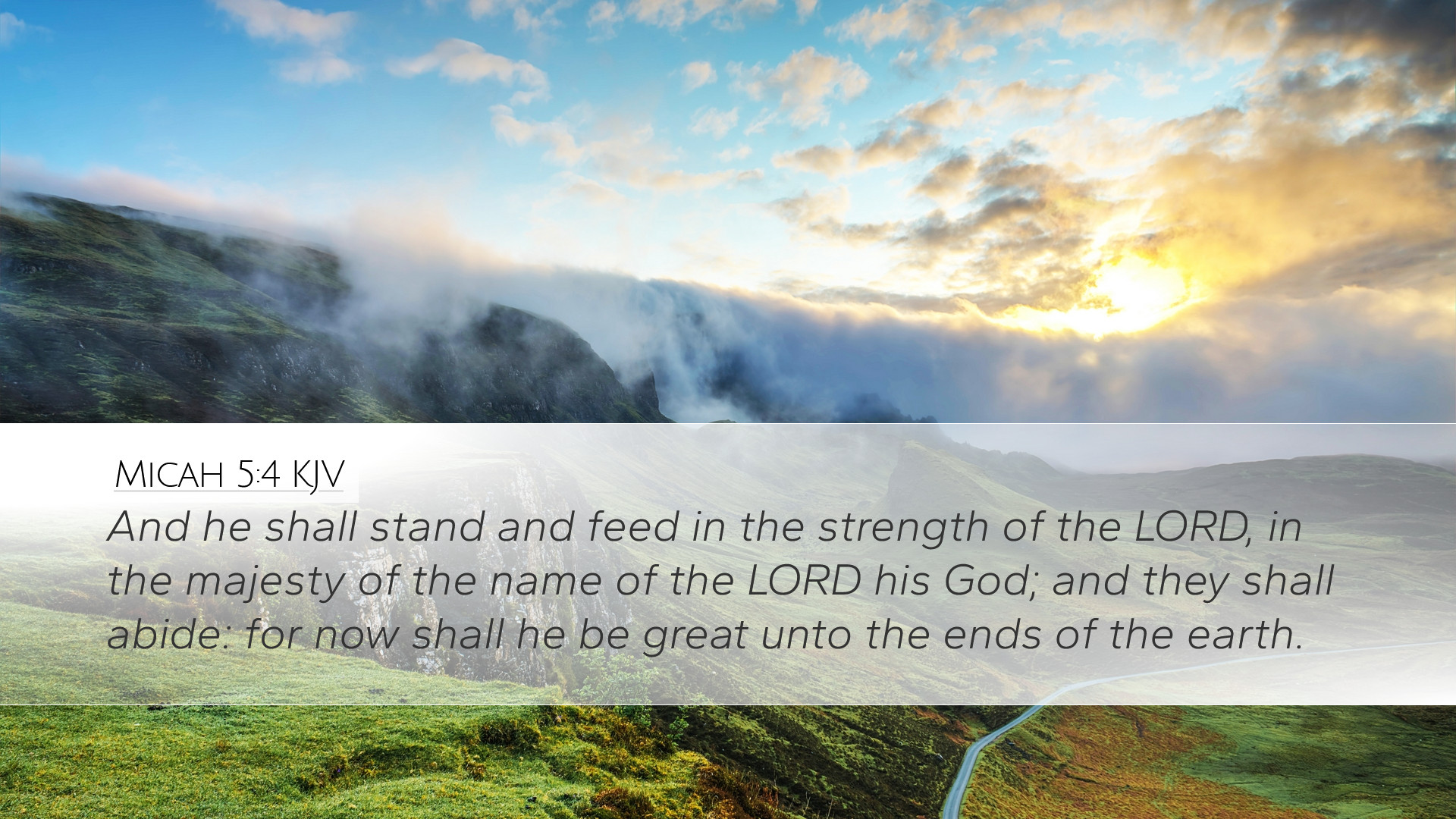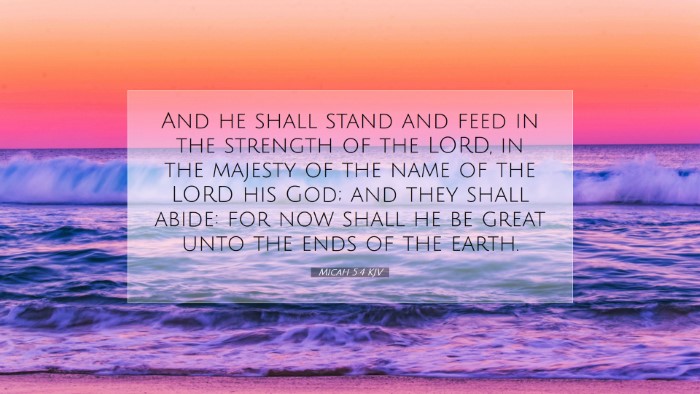Old Testament
Genesis Exodus Leviticus Numbers Deuteronomy Joshua Judges Ruth 1 Samuel 2 Samuel 1 Kings 2 Kings 1 Chronicles 2 Chronicles Ezra Nehemiah Esther Job Psalms Proverbs Ecclesiastes Song of Solomon Isaiah Jeremiah Lamentations Ezekiel Daniel Hosea Joel Amos Obadiah Jonah Micah Nahum Habakkuk Zephaniah Haggai Zechariah MalachiMicah 5:4
Micah 5:4 KJV
And he shall stand and feed in the strength of the LORD, in the majesty of the name of the LORD his God; and they shall abide: for now shall he be great unto the ends of the earth.
Micah 5:4 Bible Commentary
Commentary on Micah 5:4
Micah 5:4 states: "And he shall stand and feed in the strength of the Lord, in the majesty of the name of the Lord his God; and they shall abide: for now shall he be great unto the ends of the earth."
Contextual Overview
The Book of Micah, set in a turbulent time for Israel, brings forth a message of both judgment and hope. The prophet Micah speaks to both the Northern Kingdom of Israel and the Southern Kingdom of Judah, emphasizing their spiritual decline while also prophesying the coming of a leader who would restore and guide God’s people. Micah 5:4 is a critical verse that speaks to the character of the coming Messiah.
Thoughts from Matthew Henry
Matthew Henry highlights the dual nature of this passage. He notes that the one who comes to lead is both a shepherd and a ruler: "He shall stand and feed." Henry emphasizes the importance of leadership that is rooted in strength and grace, where Christ as the Good Shepherd combines authority with nurturing care. This imagery transcends mere kingship, suggesting a deep, personal, and communal relationship with God's people.
Furthermore, Henry remarks on the phrase "in the strength of the Lord." This suggests that the coming leader will not rely on human strength or wisdom but on divine authority and power. His rule will be characterized by the attributes of God, establishing not just a terrestrial kingdom but a heavenly one that promises peace and stability.
Insights from Albert Barnes
Albert Barnes focuses on the significance of "the majesty of the name of the Lord his God." He interprets this majesty to signify not only the glory of God but also the steadfast nature of His covenant with Israel. Barnes notes that this implies the leader's legitimacy and authority is derived directly from God, emphasizing that the success of Christ's reign is paramount to the fulfillment of God's promises to Israel and the world.
Additionally, Barnes discusses the phrase "they shall abide." This is interpreted as a promise of security and stability surrounding God’s people. Their endurance and presence in the world are tied to their alignment with this divine shepherd leader, contrasting the instability that comes from turning away from God's statutes.
Reflections from Adam Clarke
Adam Clarke provides a theological nuance regarding the term "he shall be great unto the ends of the earth." This statement of universality points towards the global reach of Christ’s influence and authority. Clarke underscores that the messianic ruler's reign was not limited to Israel but would extend to all nations, indicating a profound hope for gentiles and a restoration that goes beyond borders and ethnicity.
Additionally, Clarke highlights the prophetic nature of Micah’s words, asserting the significance of this verse during the time of Jesus. The fulfillment of this prophecy during the nativity narrative emphasizes Christ's emergence as a pivotal figure who reigns justly and brings peace to the world.
Theological Implications
- Christ as the Good Shepherd: The portrayal of the coming ruler as a shepherd is significant for understanding Christ's ministry and the nature of his leadership. This foreshadows the New Testament revelations of Jesus as the Good Shepherd who lays down his life for his sheep (John 10:11).
- The Divine Authority: The leader's strength emanates from God, reinforcing the belief that divine guidance is essential for true leadership. This sets a precedent for modern leaders to seek God's wisdom and strength in their leadership roles.
- Universal Reign: Micah’s prophecy shapes the Christian understanding of the Kingdom of God. Christ’s reign does not end with Israel but expands to understand God's intent for all humanity, calling individuals from every nation to His fold.
Conclusion
Micah 5:4 encapsulates the essence of hope and assurance for God’s people. Through the insights drawn from Matthew Henry, Albert Barnes, and Adam Clarke, this verse serves as a remarkable proclamation of Christ's coming, portraying Him as the ideal shepherd whose leadership is marked by divine provision and security. For pastors, students, theologians, and Bible scholars, this passage challenges them to reflect on the nature of true leadership modeled after Christ and to encourage others to find strength and stability in Him.


